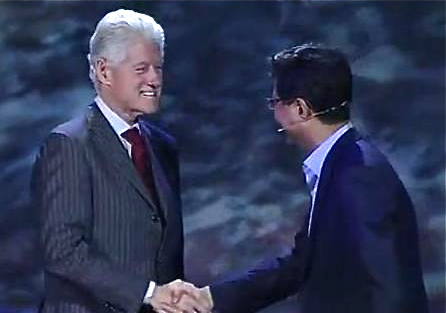CES 2013: President Clinton Surprises at Samsung Keynote
January 9, 2013
The man who sent the first email into space took to the stage to talk about technology’s role in improving the planet. Bill Clinton, 42nd President of the United States and ambassador for Samsung’s Hope For Children Foundation, was the closing act at the keynote presentation by Samsung Device Solutions President Stephen Woo at the Venetian Hotel Wednesday.
 “There were on the day I took the oath of office a grand total of 50 sites on the entire Internet. Fifty! More than that have been added since I started talking,” he said, underscoring the changes that have taken place since 1992. “Back then, a cell phone weighed five pounds.”
“There were on the day I took the oath of office a grand total of 50 sites on the entire Internet. Fifty! More than that have been added since I started talking,” he said, underscoring the changes that have taken place since 1992. “Back then, a cell phone weighed five pounds.”
Today, even those in developing nations are finding it possible to obtain lightweight, affordable smartphones that provide access to things that were previously not readily available, like medical information and banking services, revolutionizing lives in the process.
“A couple of years ago the United Nation’s reports talked about how mobile technology has done more to lift the poor than any other technology in history,” Clinton said. “The World Bank estimated that each 10 percent increase in cell phone penetration in a poor place added six-tenths of a percent to GDP growth. And I have seen that.”
While technology is working its way around the world, stark contrasts still exist: “Around here, we’d be shocked if the screen went dark or the audio failed. If you’re bored with my speech, you can leave and get water. I’ve spent time in places where they don’t take things like that for granted. Where they don’t take drinking water and air conditioning for granted.”
At the same time, technology has made it possible for nations to catch up, and even take the lead very quickly. The U.S., he pointed out, is No. 15 in the world in terms of computer download speeds, while South Korea has shot to No. 1. “Our speeds are one-fourth of theirs, and we have fallen off the map,” the former President noted.
The role of social media in precipitating major social change, like the Arab Spring and advancing the rights of girls and women, were lauded by Clinton, who sketched out a vision of technology as more than a source of entertainment or convenience.
 “The world has huge challenges that I think technology can help to overcome that are non-economic,” he said, conveying the Internet as a social bridge in a fractured world. “We’ve come such a long way. We’ve managed to overcome racism, sexism, homophobia. The only remaining bigotry we have is we don’t want to be around people who disagree with us,” he said, providing a detailed example of how voting blocks homogenize by district. “We sort ourselves out by our beliefs in a way that weakens our diversity and the potential of the country.”
“The world has huge challenges that I think technology can help to overcome that are non-economic,” he said, conveying the Internet as a social bridge in a fractured world. “We’ve come such a long way. We’ve managed to overcome racism, sexism, homophobia. The only remaining bigotry we have is we don’t want to be around people who disagree with us,” he said, providing a detailed example of how voting blocks homogenize by district. “We sort ourselves out by our beliefs in a way that weakens our diversity and the potential of the country.”
The virtual world of the Internet does the opposite, bringing a diversity of opinions into contact and building connections across cultures. “I ask you to think about how all these devices can bridge the remaining divides in the world. Is our diversity going to be a source of division or strength? Will we look at each other as adversaries or opportunities? In this too, the virtual world offers us an opportunity to come together and have an honest conversation.”
Clinton said the Internet needed to be viewed as “part of our global commitment to infrastructure, and that includes initiatives for universal broadband access.” In closing, he issued a call to action. “We are going to share the future. What you are doing can make sure we share the upside and minimize the downside. It’s the job of every citizen on the planet and you can lead the way.”

No Comments Yet
You can be the first to comment!
Leave a comment
You must be logged in to post a comment.